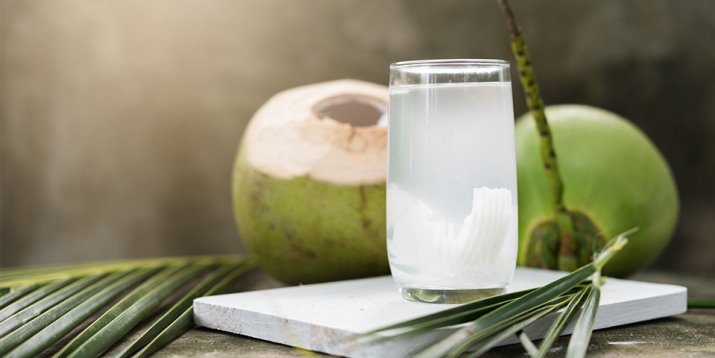Is Coconut Water Actually Good for You or Just Hype?

You probably see cartons of it lined up in the grocery store (and in your fit friend’s fridge), but is coconut water good for you? What are its benefits, and with all the other types of water, is it worth shelling out the extra money?
Read on to find out what you need to know about this trendy drink and the benefits it offers.
What Is Coconut Water?
“Coconut water is the liquid taken from an immature coconut,” explains Trinh Le, MPH, RDN. (Most of the water in a young coconut becomes coconut meat as the coconut matures.)
“It contains water, some sugars, and electrolytes like sodium, potassium, and magnesium,” she adds.
If you think about cutting off the top of a young coconut, the meat is on the inside of the husk and forms a cup for the coconut water at the center.
The Benefits of Coconut Water
Here are six ways you can benefit from drinking coconut water, according to the experts.
1. Naturally hydrating

“Coconut water can be a great rehydration drink for athletes and heavier exercisers to replace some of the electrolytes and replenish carbohydrate stores that are utilized during exercise,” says Emily Tills, MS, RDN, CDN.
One small study found that coconut water with added sodium was just as effective at rehydrating people as a sports drink.
2. Lower in sugar than most sports drink
This is a simple swap if you’re watching your sugar intake. Popular sports drinks have 13 grams of sugar per 8-ounce serving. Coconut water has about 9 grams of sugar in the same serving size, but there’s no added sugars.
3. Easy on the stomach
If you struggle with occasional post-workout nausea, coconut water might be a good rehydration option to consider. One study found that coconut water caused significantly less nausea, fullness, and stomach upset after a workout than sports drinks or plain water.
4. Coconut flavor without the fat

Unlike coconut milk, coconut water doesn’t contain fat. Coconut water is a great way to infuse tropical flavor into smoothies and shakes without adding loads of fat and excess calories.
The downside? Coconut water isn’t rich and creamy like coconut milk.
5. Good source of potassium
Coconut water could help you meet your daily potassium needs, which Tills says many of us fail to do. One cup of coconut water delivers about 600 mg potassium. It’s not a mineral to be ignored, she says, since it’s “needed in the body to help with nerve pulses and sending messages from the brain throughout the body.”
Even a mild potassium shortage can cause fatigue and muscle weakness.
6. Easy calorie-saving swap
Coconut water “contains less sugar than typical fruit juice and is likely a good swap if you regularly drink juice but want to cut down on sugars,” says Le.
She adds that although coconut water doesn’t have fat, you can still cause a calorie surplus by drinking too much of it. So while drinking it in place of higher-calorie beverages can be a healthy swap, you should still be mindful of how much you’re consuming. You can also dilute coconut water with plain water.
So if you could use a healthy alternative to water or sports drinks in your life, then coconut water is a great choice.
